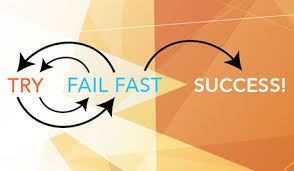 A large part of Succeeding is Failing.
A large part of Succeeding is Failing.
Not that Failure is preferable to Success, but rather its often an inevitable step on the path.
Inventors notoriously fail repeatedly when refining their inventions. Thousands of failed attempts were made to perfect a viable light-bulb, for example.
Some failures are catastrophic and should preferably never occur; the Titanic comes to mind.
Ideally, we avoid and design out all failure and risk. But in practice we are often forced to discover problems retroactively.
Failures generally precede and are fundamental to ultimate success. Little is ever perfected without repetition and improvement; in such circumstances dealing successfully with failure is an imperative.
Triumph through failing is accomplished by our distinct Actions:
Recognizing the Failure
Analyzing the Problem(s)
Developing Corrective Action
Implementing the Next Pass
And, above all DOING ALL THIS QUICKLY.
Fail Fast has been the mantra for Entrepreneurs, Inventors, Investors and Business people for decades.
Not all Failures are catastrophic; they are typically inevitable, likely or possible. The issue is to learn from them, adjust and move forwards.
These principals and Actions are by no means unique to Business and the Invention Process. They apply equally to many facets of life including, but not limited to Interpersonal Communications, Relationships and all the Sciences and Arts we might imagine.
It is our human ability to learn and move on that matters; our intellect, heart, appetite and resolve enable us to prevail and ultimately succeed.
The very act of practicing anything to perfect one’s skills is by its nature an acceptance of the role of failure in pursuit of success.
Yet the idea of Failure itself is not well received in most cultures. Nevertheless, embracing a methodology and philosophy centered around this seeming inevitability is of obviously great value.
And ultimately, we are all resultant products of our Success and Failures.
So-called, Failing Fast is critical to Manufacturing. If you’re building (say) complex or expensive goods it behooves you to test early and often to find unfixable defects quickly and eliminate further wasted investment. Both the success and profitability of most Corporations is directly tied to this approach. And of course, any fixable defects might also be reworked.
Relationships and Human Interaction can be quite similar, but might require more subtle handling. Here, sometimes rapid recognition AND correction of issues is critical; in other instances, simple early awareness and moderated reaction is more appropriate.
Examples of this might be (say) the difference between clearing a building that’s on fire, versus working through corrective action(s) for a child’s bad behavior. In both these cases knowing early on helps, but the need for immediate and brisk action can be different.
In most all instances, rapid RECOGNITION of Failure is valuable. The issue is to have the recovery process and Actions consistent (in both timing and severity) with the significance and urgency of the Failure (or, Problem).
Clearly NEW products, situations and events blatantly cry out for this type of analysis and thinking.
Thus, it’s easy to overlook established processes in need of fresh review. Initiating insightful investigation (even belatedly) often uncovers valuable new opportunities for both great and small improvements, simply by using a Fail Fast approach and mindset.
And again, these principals apply equally to Business, Personal and Family Life, Engineering, Sciences and Arts alike.
So, are you Failing Fast, when you should? Checking for troubles, early on? Are you adjusting and correcting in the appropriate timeframe?
There’s no time like the present to run these ideas and principals by your Work and Private Life to discover just what benefits and improvements are there for the taking. Give it a try.
Ian R. Mackintosh is the author of Empower Your Inner Manager Twitter @ianrmackintosh
